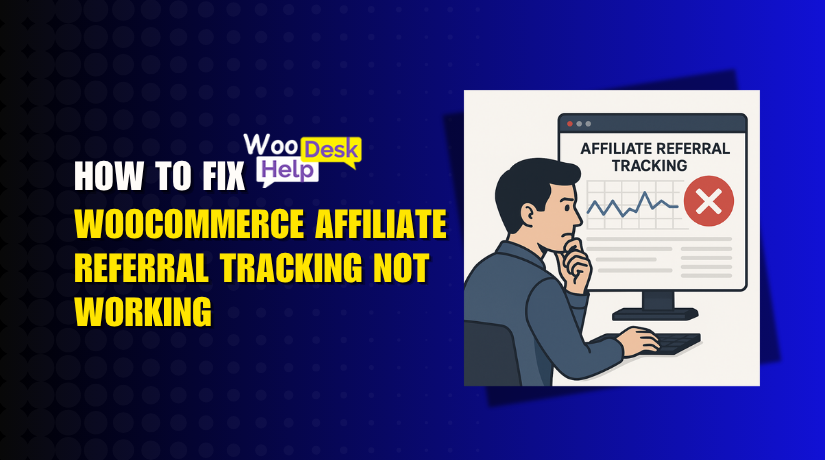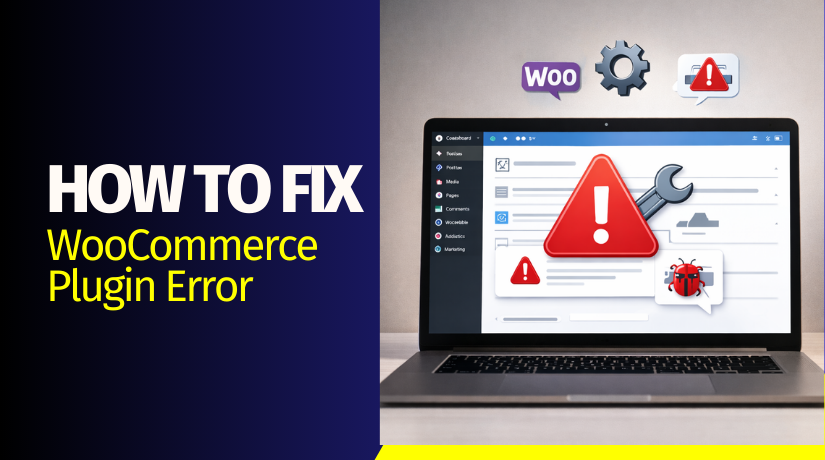
WooCommerce Affiliate Referral Tracking Not Working? Here’s How to Fix It
Table of Contents
- Introduction
- Understanding WooCommerce Affiliate Tracking
- Common Signs of a Broken Affiliate System
- Top Reasons Why WooCommerce Affiliate Referral Tracking Fails
- How to Troubleshoot and Fix Affiliate Tracking Problems
- Tools and Best Practices
- Conclusion
Introduction
Affiliate marketing plays a big role in online business growth. Many WooCommerce stores use it to drive traffic and sales. Affiliates promote products and earn a commission from each referral.
But what happens when referral tracking stops working?
You lose data, sales, and your affiliate partners lose trust.
One common complaint is: “My WooCommerce affiliate tracking issue is hurting my earnings.”
This post helps you fix that. We’ll explain what’s going wrong and how to fix it. You’ll also learn how to test, troubleshoot, and prevent these issues.
If your WooCommerce affiliate tracking problem is causing frustration, you’re in the right place.
Understanding WooCommerce Affiliate Tracking
Affiliate tracking shows how people arrive at your store. It records affiliate visits and sales from special referral links. Without it, you can’t know who sent traffic or made a sale.
A working system tracks:
- Clicks on the affiliate link
- The visitor’s activity
- The final purchase (if made)
Usually, plugins like AffiliateWP or SliceWP do this job. They use cookies to track visitors. Cookies store small pieces of data in the browser. When someone clicks a referral link, the plugin logs the cookie and tracks the action.
For example:
https://mystore.com/?ref=partner123
That URL should trigger tracking automatically.
If you see a WooCommerce affiliate link tracking error, then the process has failed. That can mean:
- No visits are logged
- No sales are tracked
- Your affiliate doesn’t get credit
This is more than a small bug. It’s a real business issue.
Affiliate sales might make up 20%–40% of your total revenue. Losing those sales hurts growth and reputation.
So if your WooCommerce affiliate link not working shows up as a trend, take it seriously.
Tracking problems can happen even if your plugin is active. Sometimes it’s a setting. Other times, it’s a conflict with another plugin or theme. It could even be a browser update blocking cookies.
Common Signs of a Broken Affiliate System
When affiliate tracking fails, problems often show up in simple ways. But if you don’t catch them early, they can hurt your business.
Here are the most common symptoms of a WooCommerce affiliate tracking issue:
Affiliate Clicks Are Not Showing
Your affiliate dashboard might show zero visits. This means the tracking system is not capturing link clicks. Even if affiliates promote your store, there’s no proof in the stats.
This can upset your partners. They may stop sharing your products. It can also make your campaign data look wrong.
If you notice WooCommerce affiliate visits not tracked, that’s a clear red flag. The system might not be recording link clicks properly.
Referrals Are Not Credited
Sometimes, clicks show up — but the sales don’t. This happens when a buyer makes a purchase, but it isn’t linked to the affiliate who referred them.
The result? No commission is earned.
If this becomes a pattern, you might see more complaints from affiliates. This also makes your reports unreliable.
Look out for these signs:
- Affiliates report lost sales
- No commissions are being paid
- The “Referrals” tab is empty, even after traffic
This points to a serious WooCommerce referral system not working issue. It should not be ignored.
Affiliate Links Are Ignored or Broken
Sometimes, a link doesn’t work as expected. The customer clicks, but nothing gets recorded.
That’s a typical referral link tracking failed WooCommerce issue. The link may look fine but is not triggering the cookie or tracking event.
You might see:
- Links opening the site, but not setting cookies
- Links redirecting incorrectly
- Query parameters (like ?ref=partner123) getting stripped out
These problems often come from caching, redirects, or plugin conflicts.
If your WooCommerce affiliate link not working, test it in a private window. If tracking still fails, you need to dig deeper.
Tracking Works for Some Affiliates Only
This issue is tricky. Some affiliate links work fine, while others don’t.
This could mean certain devices, browsers, or networks are blocking cookies. Or one affiliate is using the wrong link structure.
The problem here is inconsistency. It damages trust and creates confusion.
This is often part of a WooCommerce referral tracking broken problem. It usually needs a full review of your setup.
Top Reasons Why WooCommerce Affiliate Referral Tracking Fails
Affiliate tracking is the backbone of your WooCommerce referral program. When it breaks, affiliates lose trust, and you lose revenue. Many store owners notice their affiliate links stop working without warning.
Here are the most common reasons WooCommerce referral tracking fails. Each issue has its own cause and must be understood clearly before you can fix it.
- Cookies Blocked or Expired
Affiliate systems rely on browser cookies to track visits and sales. These cookies store the referral data when someone clicks a special affiliate link. If cookies do not work, tracking cannot happen.
Several issues can cause this:
- The user’s browser blocks cookies, especially in private or incognito mode
- Some browsers like Safari or Brave restrict cookies by default
- Users may have installed privacy tools or extensions that block tracking
- Cookie duration in your plugin may be set too short
If a visitor clicks today and buys tomorrow, but the cookie expired, the affiliate doesn’t get credited. This often leads to complaints like “WooCommerce affiliate visits not tracked.”
- Caching and Optimization Conflicts
WooCommerce stores often use caching plugins and optimization tools. These tools are great for speed — but can cause major issues for affiliate tracking.
Caching can:
- Strip away important parts of the referral link, like ?ref=partner
- Serve a preloaded page that skips running tracking scripts
- Delay the loading of JavaScript that drops tracking cookies
When this happens, a referral visit is completely missed. This leads to what feels like a “referral link tracking failed WooCommerce” problem, even if the plugin is working.
- Broken or Conflicting JavaScript
Affiliate tracking plugins use JavaScript to function. The script helps create and store cookies or send tracking data to the system.
But if JavaScript fails to load or run, tracking won’t happen. This can occur when:
- Your theme has broken scripts
- Another plugin adds conflicting JavaScript
- jQuery is missing or loads in the wrong order
These technical issues often go unnoticed. But they silently stop tracking from working, leading to a “WooCommerce affiliate link not working” complaint.
- Misconfigured Plugin Settings
Even a small mistake in settings can stop referral tracking. This is a common cause, especially when plugins are installed quickly and not reviewed thoroughly.
Some possible misconfigurations include:
- Cookie lifetime set too short (like 1 day)
- Incorrect referral URL format (missing query parameter)
- Settings that block tracking for logged-in users
- Rules that exclude specific pages or traffic sources
When settings aren’t correct, your plugin behaves normally on the surface — but fails to track in the background. That leads to a “WooCommerce affiliate tracking problem” without visible errors.
- Incorrect Link Structure or Manual Errors
Sometimes, affiliates use or share links that are not properly formed. If the referral link is missing a tracking code or has the wrong format, the system can’t register the visit.
For example:
- The link uses refid= instead of the correct ref=
- It points to an HTTP version instead of HTTPS
- There’s a typo or a wrong affiliate ID in the URL
These errors often happen when links are typed manually. It results in “affiliate link tracking issue in WooCommerce” complaints, even though the site and plugin are fine.
- Theme or Template Overwrites
Some themes override default WooCommerce templates or scripts. These customizations can remove essential hooks or tracking code that the plugin needs.
For instance:
- A theme may skip the footer area where scripts should load
- It may use custom headers that don’t allow query parameters to pass
- Lightweight themes may disable scripts for faster loading
These changes break referral tracking silently. They often cause the issue known as “WooCommerce referral tracking broken.”
How to Troubleshoot and Fix Affiliate Tracking Problems
Once you understand why affiliate tracking fails, the next step is fixing it. This section covers practical ways to find and resolve the issue. These fixes are easy to follow, even if you’re not a developer.
- Test the Affiliate Link in a Clean Browser
The first step is to see if the affiliate link works. Open it in a private or incognito window. This helps test the link without any browser cache, cookies, or login data interfering.
If the visit doesn’t show up in your plugin dashboard, the link is likely broken.
Also test the link in:
- A different browser (like Firefox or Chrome)
- A different device (desktop and mobile)
If it works in one but not the other, the issue may be browser-specific.
- Check If Cookies Are Being Set
Affiliate tracking depends on browser cookies. If they’re not set, no tracking can occur.
You can check cookies using browser developer tools:
- Right-click anywhere on the page and click Inspect
- Go to the Application tab and look under “Cookies”
- Check if any cookie related to your affiliate plugin appears
If no cookie appears after clicking the link, your plugin may not be working properly.
This simple test helps confirm a WooCommerce affiliate tracking issue before you move further.
- Review Plugin Settings Carefully
Sometimes, settings are the main problem. Go into your affiliate plugin and check:
- Cookie expiration time (30 to 90 days is ideal)
- Whether tracking is enabled for all user types
- If the referral URL format matches what your affiliates are using
- Any excluded pages or user roles that block tracking
Even one wrong setting can cause affiliate tracking to stop in WooCommerce.
- Disable Caching or Exclude Affiliate Pages
Caching tools improve speed but can block referral tracking. They may strip the affiliate code from URLs or prevent scripts from loading.
To fix this:
- Exclude key affiliate pages (landing or product pages) from caching
- Turn off JavaScript minification in your caching plugin
- Disable page caching temporarily and test the affiliate link again
If the link works after caching is disabled, then that’s your culprit.
- Temporarily Switch to a Default Theme
Custom themes often break plugin functions. Switch your theme to a basic one like Storefront and test again.
If the affiliate tracking starts working, the issue is in your theme’s code. It may be removing or changing important parts of WooCommerce pages.
This helps confirm if you’re facing a WooCommerce affiliate link tracking error due to your theme.
- Check for Plugin Conflicts
Deactivate all plugins except WooCommerce and your affiliate plugin. Then, test the referral link again.
If tracking works now, start enabling other plugins one by one. When the issue returns, you’ve found the conflicting plugin.
Some performance, security, or SEO plugins can conflict with tracking scripts.
- Use a Debug Tool to Trace the Issue
Use tools like Query Monitor, Google Tag Assistant, or browser console logs to see what happens when a user clicks the link.
Look for:
- JavaScript errors
- Missing tracking requests
- Failed cookie actions
These tools give deeper insights without needing advanced coding knowledge.
Fixing affiliate tracking takes patience and careful testing. Start with your affiliate link, then check cookies, settings, caching, and conflicts. Most issues can be resolved without needing a developer.
Tools and Best Practices
Once you’ve fixed the tracking issues, it’s important to make sure they don’t return. This section covers trusted tools, long-term habits, and ways to prevent future problems with affiliate tracking in WooCommerce.
- Use Trusted Plugins for Affiliate Tracking
The plugin you use makes a big difference. Poorly coded plugins often cause issues with tracking, cookies, or compatibility.
Here are some reliable plugins used by thousands of WooCommerce stores:
- AffiliateWP – Easy to set up and reliable tracking with good support
- SliceWP – Clean interface, accurate referral tracking, and flexible setup
- YITH WooCommerce Affiliates – Useful for basic affiliate needs
These plugins are built to work well with WooCommerce updates. They reduce the chance of tracking failures.
Avoid free or unknown plugins unless they are well-reviewed and updated regularly.
- Use UTM Parameters for Extra Tracking
In addition to your plugin’s referral tracking, you can also add UTM parameters. These are tags added to the URL to help Google Analytics track the visit.
For example:
https://yourstore.com/product-name/?ref=partner123&utm_source=affiliate&utm_campaign=summer
With UTM tags, you can:
- Monitor visits in Google Analytics
- Track the success of each campaign
- Double-check your plugin’s data for accuracy
This is useful when you want to verify that affiliate visits match analytics reports.
- Monitor Tracking Regularly
Affiliate tracking is not a one-time setup. You need to check it from time to time to make sure it’s working.
Make it a habit to:
- Test an affiliate link monthly in an incognito browser
- Review the affiliate dashboard for missing clicks or referrals
- Ask a trusted affiliate to test a new link now and then
This helps catch issues early, before they affect your income or reputation.
- Avoid Conflicts with Cache and Performance Tools
Speed optimization is important, but not at the cost of lost sales. Many performance tools can interfere with tracking scripts or links.
To keep both working well:
- Exclude your key landing pages from cache
- Avoid aggressive minification of JavaScript files
- Use a plugin that supports WooCommerce compatibility
Make sure any tool you use is tested alongside your affiliate system.
- Know When to Get Expert Help
Sometimes, the issue is more complex. If you’ve tried everything and tracking still doesn’t work, it may be time to get help.
You may need a developer or a WooCommerce specialist to:
- Review your theme code
- Debug advanced plugin conflicts
- Customize your referral system for your setup
If you need expert assistance, services like WooHelpDesk.com offer specialized support for WooCommerce stores.
Conclusion
Affiliate tracking is critical for the success of your referral program. When it stops working, you lose both data and income.
By using the right tools, testing regularly, and following best practices, you can avoid most tracking problems. If issues do come up, now you know how to handle them.
Want peace of mind? Need help fixing or improving your affiliate setup?
👉 Contact WooHelpDesk today for fast, expert WooCommerce support.




